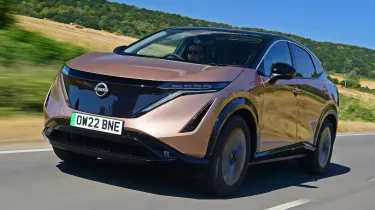Nissan calls for urgent action on ZEV mandate

Nissan wants the Government to take “urgent action” on the ZEV (zero-emission vehicle) mandate, warning that it is unfairly penalising car makers and jeopardising investment.
The Japanese company, which operates the huge production facility in Sunderland, was among a number of manufacturers that met with Transport Secretary Louise Haigh on Wednesday to discuss a number of issues regarding the transition to electrification.
But as a statement from Nissan revealed, it is the implications of the ZEV mandate – which requires car manufacturers to sell an increasing percentage of electric cars each year – that are at the top of the agenda for most makers.
Although there are some loopholes which can be exploited – such as exemptions and the ability to trade credits – the mandate for 2024 requires 22% of each manufacturer’s new car sales to be zero emission. This will increase to 28% in 2025, and 80% by 2030. Current Society of Motor Manufacturers and Traders figures suggest EV sales will comprise only 18.5% of the market this year.
Guillaume Cartier, chairperson for the Nissan Africa, Middle East, India, Europe and Oceania (AMIEO) region, hinted that a failure to reconsider the figures and the mandate could have devastating consequences for the country. He said: “The mandate risks undermining the business case for manufacturing cars in the UK, and the viability of thousands of jobs and billions of pounds in investment.
“We now need to see urgent action from the Government by the end of the year to avoid a potentially irreversible impact on the UK automotive sector.”
A specific concern for Nissan is that one way of avoiding the fine is by purchasing credits from an EV-only brand – but as no such brand actually manufactures cars in the United Kingdom, it will effectively be subsidising the EV sectors in other countries, at the expense of investment in Britain.
The concern that manufacturers have was underlined by SMMT chief executive Mike Hawes. He said: “The industry [has] made clear its concerns about the pace of the EV transition and the negative effect this is having on the health of the overall market and the attractiveness of the UK as a manufacturing location.
“A strong market and manufacturing base that sustains jobs and drives growth requires workable regulation backed by support for consumers – fiscal incentives and confidence that the charging network will be there when it is needed.
“We will now work urgently with government to identify any adjustments necessary to help the industry and government meet their targets, instilling confidence in the consumer and other stakeholders, all of whom are part of this transition.”
However, despite Haigh recently saying she was “in listening mode” and open to assisting the car industry, there is no immediate indication that the Government is prepared to be flexible. Indeed, a report by the Financial Times in the aftermath of the meeting quoted an unnamed official dismissing the idea of fines being delayed until the end of 2025, saying: “This is not going to happen.”



